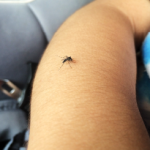“Given our findings in the largest cohort study thus far for analysis of synovial fluid, it would indicate that most likely it would probably be safe to treat chikungunya arthritis with antirheumatic immunomodulating medications two years after infection, which is the standard of care in the French guidelines,”5 Dr. Chang says. Some physicians have prescribed these agents, but a rheumatologist who has experience with only a handful of patients with chikungunya arthritis “may feel a bit intimidated about using them because we don’t yet understand the pathophysiology. Our findings would indicate there is some justification for rheumatologists who may want to try these medications but have been worried about systemic viral dissemination,” she says.
Dr. Mahalingam and colleagues say that in the absence of national guidelines, practicing rheumatologists “may … consider an early switch to DMARDs from the eighth week after the onset of infection—to be discontinued after several months of disease inactivity monitored on serial DAS28 scale measurements.” The researchers recommend that biologics be reserved for cases with evidenced refractory synovitis “as a conservative option when conventional synthetic DMARDs are not sufficient. No experimental antiviral drugs targeting viral replication (or host factors) have yet been tested in clinical trials.”
They highlight the need for multidisciplinary management of chronic CHIKV disease, with practicing rheumatologists joining with a pain specialist, a physiotherapist and even a neurologist or psychiatrist as needed. Additionally, morphological assessment (designed to evaluate the fulfillment of current criteria for rheumatoid arthritis or spondyloarthritis) and laboratory tests are generally performed to confirm the diagnosis and screen for evidence of inflammatory rheumatic disorders or other destructive mechanisms.
More research about the molecular mechanisms tied to chronic disease is needed, as well as guidance on treatment of patients who can suffer debilitating symptoms years after initial infection. “The medications we are using to treat chikungunya arthritis are empiric anti-inflammatory immunomodulating medications without truly understanding the mechanism whereby chikungunya causes arthritis,” says Dr. Chang.
She and her colleagues are now exploring the epigenetics of patients with chikungunya. “We have found that patients with chikungunya arthritis have epigenetic changes that [healthy] patients do not have. If we can identify how chikungunya alters the immune response, we would then be able to provide targeted therapies as opposed to providing more empiric therapies,” she says.
Kathy Holliman, MEd, has been a medical writer and editor since 1997.
References
- Zaid A, Gérardin P, Taylor A, et al. Chikungunya arthritis: Implications of acute and chronic inflammation mechanisms on disease management. Arthritis Rheumatol. 2018 Apr;70(4);484–95.
- Chang AY, Encinales L, Porras A, et al. Frequency of chronic joint pain following chikungunya virus infection: A Colombian cohort study. Arthritis Rheumatol. 2018 Apr;70(4):578–584.
- Chang AY, Martins KAO, Encinales L, et al. Chikungunya arthritis mechanisms in the Americas: A cross-sectional analysis of chikungunya arthritis patients 22 months after infection demonstrating no detectable viral persistence in synovial fluid. Arthritis Rheumatol. 2018 Apr;70(4):585–593.
- Hoarau JJ, Jaffar Bandjee MC, Krejbich Trotot P, et al. Persistent chronic inflammation and infection by Chikungunya arthritogenic alphavirus in spite of a robust host immune response. J Immunol. 2010 May 15;184(10):5914–5927.
- Simon F, Javelle E, Cabie A, et al. French guidelines for the management of chikungunya (acute and persistent presentations). Med Mal Infect. 2015 Jul;45(7):243–263.

